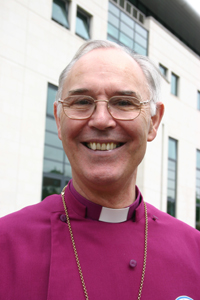Please choose a year:
 Addressing the General Synod today for the first time as President, the recently elected Archbishop of Armagh, the Most Reverend Alan Harper OBE, urged members to send a clear message of support to those entering the newly formed Executive of the Northern Ireland Assembly. "Much trust has been placed in them; much is expected of them; the hopes and dreams of millions in this island for a constructive, shared future, marked by justice, equality and mutual respect, lie squarely on their shoulders," he said. Adding that a difficult job lies ahead for members of the Assembly, the Archbishop noted the important contribution of the Church at this stage. "Clearly the electorate will hold politicians to account for their stewardship of the responsibilities they have sought and been given. The Church will feel free to criticise, cajole and encourage. Meanwhile, politicians in all parts of this island deserve our respoect in acknowledgement of the demanding nature of the task they undertake on our behalf."
Addressing the General Synod today for the first time as President, the recently elected Archbishop of Armagh, the Most Reverend Alan Harper OBE, urged members to send a clear message of support to those entering the newly formed Executive of the Northern Ireland Assembly. "Much trust has been placed in them; much is expected of them; the hopes and dreams of millions in this island for a constructive, shared future, marked by justice, equality and mutual respect, lie squarely on their shoulders," he said. Adding that a difficult job lies ahead for members of the Assembly, the Archbishop noted the important contribution of the Church at this stage. "Clearly the electorate will hold politicians to account for their stewardship of the responsibilities they have sought and been given. The Church will feel free to criticise, cajole and encourage. Meanwhile, politicians in all parts of this island deserve our respoect in acknowledgement of the demanding nature of the task they undertake on our behalf."
Archbishop Harper also referred to the recent statement from the UVF in which thery promised to put all weaponry beyond reach and co-operate with the police. "They could, of course, have gone further," he said, "and I wish they had, but I welcome their statement as a significant step along the road to the complete removal of paramilitary violence from our society and an investment in peace building and the normalization of the political process."
Synod and the shape of things to come
Much of the Presidential Address was concerned with the current model of synodical government of the Church of Ireland and suggestions for how the General Synod could become a more effective means of communication for the Church as a whole. Bill No.4, to be recieved later today, puts forward proposals for a new structure of the membership of the General Synod, based on the number of cures in each diocese. However, Archbishop Harper told the meeting today that there were other issues, concerning the church of Ireland's communication with the wider community that must be addressed also. "The General Synod does and should have an important role in furthering the mission of the Church," he said, "but it isn't working as well as it should and could. Whether by age or accident, the Synod is now failing effectively to communicate its message in ways that resonate with the needs of the 21st century."
Each year, the General Synod received a Book of Reports, which includes reports from the various committees of the Church of Ireland regarding their work completed during the year. However, Archbishop Harper suggested that it was time for Synod to do more than just consider reports based on business past, and must begin to receive and debate motions outlining the shape and direction that each board and committee wishes to take. Substantive issues and opinions should be brought to the meeting of the Synod for determination. In this way, the General Synod would be more authoritatively speaking for, and on behalf of, the Church of Ireland.
Furthermore, the Archbishop called for a definite set of priorities to be set for the work of the Church of Ireland, going into the future and consideration needs to be given to what are the principal areas of concern in the Church life, and what structures need to be put in place in order to deal effectively with these concerns.
Education
Turning to the Review of Public Administration and the issue of education in Northern Ireland, the Archbishop highlighted the importance of the Church’s input into the current proposals with regard to the influence of transferors in the educational system. “It is important that we should be saying something quite specific about the character and values that we believe should mark the educational system as a whole, and the schools in particular,” he said. “I believe that we should be clear that even for those who profess no Christian faith, the values and standards inherited from the Christian tradition remain important….. I therefore believe that in all schools, but especially in church-related schools, there should be overarching principles and emphases which we now need to advocate.” The Archbishop emphasised the need for continued to debate which the Church must engage with in order to make its voice heard. He went on to welcome the initiative of An Taoiseach, Bertie Ahern TD, to conduct structured dialogue on government policy with various stakeholders, including the Churches, and also the introduction of structures to enable similar dialogue at Civil Service level in Northern Ireland. “The Churches have an important role to play in shaping future society here in Ireland. My aim is that the Church of Ireland should be fully fitted to engage effectively in such a dialogue and that our voice should be clearly heard. I commend that aspiration to the General Synod,” the Archbishop concluded.

